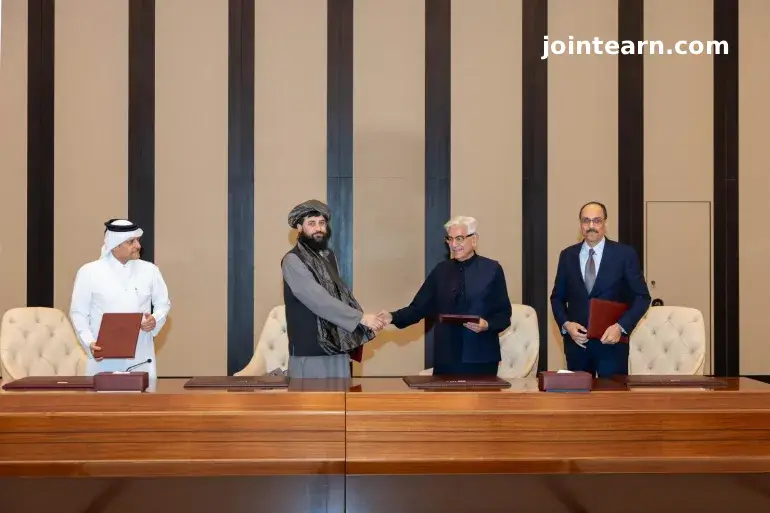
DOHA, Qatar — October 19, 2025 — In a major diplomatic breakthrough, Afghanistan and Pakistan have agreed to an immediate ceasefire following a week of intense cross-border clashes that left dozens dead and hundreds injured. The deal, mediated by Qatar and Turkiye, aims to halt hostilities and lay the groundwork for lasting peace between the two South Asian neighbours.
Ceasefire Agreement Marks a Step Toward Stability
Qatar’s Ministry of Foreign Affairs announced early Sunday that both nations agreed to stop fighting “immediately” and to establish joint mechanisms for consolidating peace and stability.
According to Doha’s statement, Afghanistan and Pakistan will hold follow-up meetings in the coming days to ensure the truce’s sustainability and to verify implementation through a reliable monitoring framework.
The talks in Doha, which began on Saturday, were the first direct high-level dialogue between the two governments since border tensions escalated earlier this month.
The Afghan delegation, led by Defence Minister Mullah Muhammad Yaqoob, and the Pakistani delegation, headed by Defence Minister Khawaja Muhammad Asif, reached the accord after hours of closed-door negotiations facilitated by Qatari and Turkish diplomats.
Reactions from Both Sides
Pakistan’s Deputy Prime Minister and Foreign Minister Ishaq Dar hailed the ceasefire as a “first step in the right direction,” expressing gratitude to Qatar and Turkiye for their mediation efforts.
“Deeply appreciate the constructive role played by brotherly Qatar and Turkiye,” Dar wrote on X (formerly Twitter). “We look forward to the establishment of a concrete and verifiable monitoring mechanism, in the next meeting to be hosted by Turkiye, to address the menace of terrorism emanating from Afghan soil toward Pakistan.”
He also emphasized the need to “prevent any further loss of lives” and to ensure that peace efforts translate into tangible security on the ground.
Clashes Along the Durand Line
The ceasefire comes after a week of fierce cross-border clashes along the Durand Line, a 2,600km (1,600-mile) frontier separating the two nations. The violence — the deadliest since the Taliban’s takeover of Kabul in 2021 — involved artillery exchanges, air strikes, and suicide attacks.
Tensions spiked after Pakistan accused Afghanistan’s Taliban-led government of harbouring armed groups responsible for a series of attacks inside Pakistan. The Pakistani military launched retaliatory airstrikes targeting what it described as militant safe havens inside Afghan territory.
In response, the Taliban accused Pakistan of spreading “misinformation” and claimed that Islamabad has itself harboured ISIL (ISIS)-linked militants who have destabilized Afghanistan’s border regions.
On Friday, a suicide attack near the Chaman border crossing killed seven Pakistani soldiers and wounded 13, intensifying Islamabad’s demands for Kabul to “rein in proxy fighters.”
Pakistan’s army chief, Field Marshal Asim Munir, said during a graduation ceremony on Saturday that “the Afghan regime must take responsibility for groups using Afghan soil to carry out heinous attacks inside Pakistan.”
Path Forward: Monitoring and Implementation
As part of the Doha agreement, both governments pledged to set up joint border monitoring and communication channels to prevent future escalations. The next round of peace meetings will be hosted by Turkiye, where both sides are expected to finalize the structure of a verifiable ceasefire mechanism.
Regional analysts view the deal as a critical first step toward rebuilding trust between the two uneasy neighbours, whose relations have soured since the Taliban’s return to power.
Security experts caution, however, that ensuring long-term peace will depend on both sides’ commitment to counterterrorism cooperation, border control, and intelligence sharing.
Broader Regional Implications
The truce has been welcomed internationally as a rare diplomatic success in South Asia, where cross-border violence has long hindered development and regional cooperation.
Qatar’s Foreign Ministry said it “remains committed to supporting sustainable peace in the region,” while Turkiye reaffirmed its readiness to “facilitate dialogue and trust-building measures.”
If successfully implemented, the Afghanistan–Pakistan ceasefire could serve as a model for conflict resolution through regional diplomacy, setting the stage for future cooperation on security, trade, and humanitarian assistance.


Leave a Reply